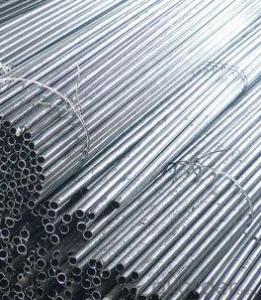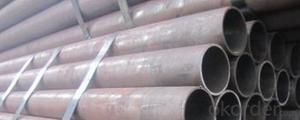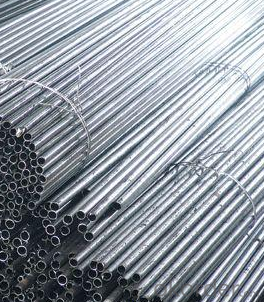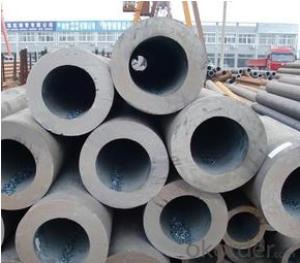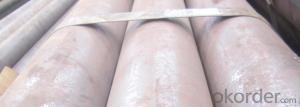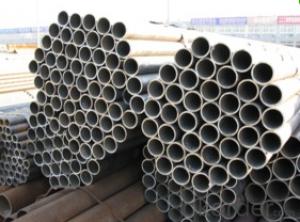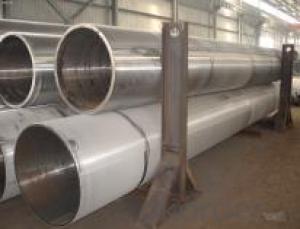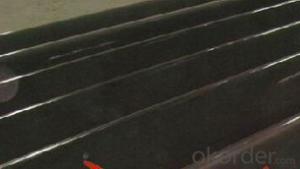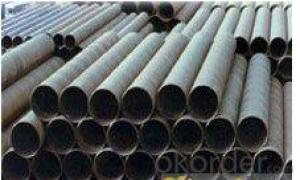Schedule 40 Seamless Carbon Steel Pipe API P110 CNBM
- Loading Port:
- Qingdao
- Payment Terms:
- TT OR LC
- Min Order Qty:
- 10 pc
- Supply Capability:
- 30 pc/month
OKorder Service Pledge
OKorder Financial Service
You Might Also Like
Quick Details
| Thickness: | 1.73 - 59.54 mm | Section Shape: | Round | Outer Diameter: | 10.3 - 914.4 mm |
| Secondary Or Not: | Non-secondary | Application: | Fluid Pipe | ||
| Technique: | Hot Rolled | Certification: | API | Surface Treatment: | Galvanized,vanish covering, black painting, galvenized ect. |
| Special Pipe: | API Pipe | Alloy Or Not: | Non-alloy | Length: | 5-12m as per customer's requirements |
| SCH: | SCH10~160, STD, XS & XXS | Payment Terms: | L/C T/T | Supply Ability: | 5000 Ton/Tons per Week |
| Product: | pipe prices | Grade: | 10#,20#,45#,A106(B,C),A53(A,B),12Cr1MoV,12Cr1MoVG,12Cr2Mo,13CrMo44,13CrMo45,15CrMo,15CrMoG,St52,St52.4,10#-45#,A53-A369,Cr-Mo alloy,ST35-ST52 | Standard: | API 5CT,API 5L,ASTM A106-2006,ASTM A53-2007,DIN 17175,GB 3087-1999,GB 5130,GB 6479-2000,GB 9948-2006,GB/T 17396-1998,GB/T 5312-1999,GB/T 8162-1999,GB/T 8163-1999,API,ASTM,DIN,GB |
Packaging & Delivery
| Packaging Detail: | By bundles, seaworthy wooden cases, steel framed cases, and simple packaging or according to the demand of the customers. |
| Delivery Detail: | within 5-15 days |
Specifications
1.pipe prices
2.Supply Ability:5000 Tons per Week
3.Payment Terms:L/C T/T
High quality Carbon steel pipe, Best pipe prices
1) Application: Overheat pipe for low and mediumpressure boiler,boiling water pipe, locomotive smoke pipe(big and small),Carry gas ,water or oil in the industries of petroleum and natural gas etc
2) Materials: 10#, 20#, 45#, 15CrMo, 12Cr1MoV, 13CrMo44, 12Cr2Mo, 13CrMo45, 12Cr1MoVG, 15CrMoG, API J55, API K55, API N80, API L80, API P110
3)Pipe according to standard: GB 3087-1999, GB/T 8163-1999, GB/T 8162-1999, GB 9948-2006, GB/T 17396-1998, GB/T 5312-1999, GB 6479-2000, GB 5130, DIN 17175, API 5CT, API 5L .
4)Packing: By bundles, seaworthy wooden cases, steel framed cases, and simple packaging or according to the demand of the customers.
Technical Parameters of Seamless Steel Pipe
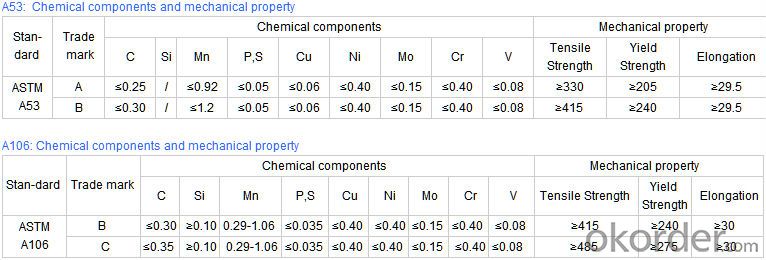
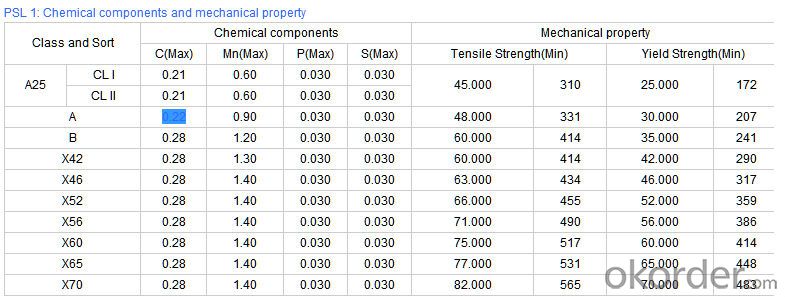
- Q: Can steel pipes be used for underground stormwater systems?
- Yes, steel pipes can be used for underground stormwater systems. Steel pipes are durable and resistant to corrosion, making them a suitable choice for underground applications. Additionally, steel pipes can handle high volumes of stormwater, making them ideal for stormwater management systems.
- Q: What's the material of Q325 steel pipe?
- Q235 refers to the material yield stress of 235MPa carbon steel, because of its low price, good machining and welding performance, it is generally used for welding structural parts. Of course, the unimportant parts can be used for it.
- Q: How are steel pipes used in hydroelectric power plants?
- Steel pipes are used in hydroelectric power plants to transport water from the reservoir to the turbines. These pipes are designed to withstand high pressure and are often used for penstocks, which are large vertical pipes that deliver water to the turbines at a controlled rate. The durability and strength of steel pipes make them ideal for withstanding the force of the flowing water and ensuring a reliable water supply for power generation.
- Q: What are the safety considerations when working with steel pipes?
- When working with steel pipes, there are several important safety considerations to keep in mind. Firstly, it is crucial to wear appropriate personal protective equipment (PPE). This includes safety glasses or goggles to protect the eyes from flying debris or sparks, gloves to protect the hands from sharp edges or hot surfaces, and steel-toed boots to protect the feet from falling objects or heavy equipment. Additionally, wearing a hard hat is recommended to protect the head from potential falling objects or overhead hazards. Next, it is important to be aware of the weight and size of steel pipes. Handling heavy pipes can put strain on the back and muscles, so it is essential to use proper lifting techniques and seek assistance when necessary. Using lifting equipment, such as cranes or forklifts, can also help prevent injuries related to heavy lifting. Another safety consideration is the risk of cuts or punctures. Steel pipes can have sharp edges or burrs, so it is important to handle them with care and wear appropriate gloves to reduce the risk of injury. Inspecting pipes for any defects or sharp edges before working with them is also recommended. Furthermore, working with steel pipes may involve welding or cutting, which can produce sparks, heat, and fumes. It is crucial to work in a well-ventilated area or use proper ventilation equipment to ensure the removal of harmful gases or fumes. Fire safety precautions should also be taken, such as having fire extinguishers nearby and following proper procedures for hot work. Lastly, it is important to be aware of potential hazards associated with working at heights or in confined spaces. When working on elevated platforms or scaffolding, fall protection measures, such as safety harnesses or guardrails, should be in place. In confined spaces, proper ventilation and monitoring for hazardous gases are essential to prevent asphyxiation or exposure to toxic substances. Overall, by following these safety considerations and adhering to proper procedures, the risk of accidents or injuries when working with steel pipes can be significantly reduced.
- Q: How are steel pipes used in the construction of geothermal power plants?
- Steel pipes are used in the construction of geothermal power plants for various purposes. They are primarily used to transport and circulate the geothermal fluid, which carries the heat from the underground reservoir to the surface. These pipes are typically made of high-quality steel that can withstand the high temperatures and corrosive nature of the geothermal fluid. Additionally, steel pipes are used in the construction of injection wells, where cool water or other fluids are injected back into the reservoir to maintain pressure and sustain the heat extraction process. Overall, steel pipes play a crucial role in the efficient and reliable operation of geothermal power plants.
- Q: What is the role of steel pipes in the transportation of water?
- Steel pipes are of utmost importance in the transportation of water due to their durability and strength. They find extensive use in diverse water supply systems, including municipal water distribution networks, irrigation systems, and industrial water transportation. One of the primary benefits of steel pipes lies in their capacity to endure high pressure and deliver water reliably over long distances. The strength of steel enables the construction of pipelines with larger diameters, facilitating the efficient movement of substantial water volumes. Additionally, steel pipes exhibit remarkable resistance to corrosion, a critical characteristic when conveying water that may contain different minerals, chemicals, or contaminants. The corrosion-resistant properties of steel pipes ensure that the water quality remains uncompromised throughout the transportation process. Furthermore, steel pipes offer exceptional structural integrity, rendering them suitable for both underground and above-ground installations. They can withstand extreme weather conditions, seismic activity, and heavy loads, thereby ensuring the longevity and dependability of the water transportation system. Moreover, steel pipes are easy to install and maintain, apart from being robust and durable. They can be seamlessly welded together, resulting in a pipeline with minimal leakage points. Regular inspections and maintenance help identify potential issues or damages, guaranteeing an uninterrupted flow of water. In conclusion, steel pipes play a critical role in water transportation, serving as a strong and reliable conduit. Their ability to withstand high pressure, resist corrosion, and maintain water quality make them an ideal choice for various water supply systems, contributing to the efficient and sustainable distribution of water resources.
- Q: What are the factors affecting the pressure rating of steel pipes?
- The factors affecting the pressure rating of steel pipes include the thickness and quality of the steel used, the diameter and length of the pipes, the temperature and fluid being transported, as well as the design and construction of the pipe system.
- Q: How are steel pipes marked for identification?
- Steel pipes are typically marked for identification using various methods such as color coding, stenciling, engraving, or applying tags with relevant information such as size, grade, manufacturer, and specifications.
- Q: How do you remove rust from steel pipes?
- One effective way to remove rust from steel pipes is to use a wire brush or steel wool to scrub the affected areas. You can also apply a rust dissolver or a mixture of lemon juice and salt on the rusted spots and let it sit for a few hours before scrubbing. Additionally, using a commercial rust remover or a vinegar solution can also help in removing rust from steel pipes.
- Q: What are the common factors affecting the lifespan of steel pipes?
- The common factors affecting the lifespan of steel pipes include corrosion, external damage or impact, poor installation or maintenance practices, and exposure to extreme temperatures or harsh environments.
Send your message to us
Schedule 40 Seamless Carbon Steel Pipe API P110 CNBM
- Loading Port:
- Qingdao
- Payment Terms:
- TT OR LC
- Min Order Qty:
- 10 pc
- Supply Capability:
- 30 pc/month
OKorder Service Pledge
OKorder Financial Service
Similar products
Hot products
Hot Searches
Related keywords
